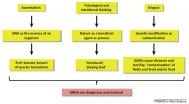Risk perception: Social exchange can amplify subjective fears
'Pass the message' experiment investigates how people perceive and communicate the risks of a widely used chemical
2015-04-24
(Press-News.org) This news release is available in German.
The world is a risky place. But our subjective fears and anxieties are often at odds with the evidence. New findings by scientists at the Max Planck Institute for Human Development and the University of Konstanz show that subjective fears about potential risks may be amplified in social exchange. Their findings have now been published in the journal Proceedings of the National Academy of Sciences (PNAS).
In our information society, information about risks such as Ebola and measles can spread like wildfire - be it through traditional and social media or through direct person-to-person contact. In many cases, social exchanges detailing risks are not objective and unemotional, but carry subjective perceptions of risk. What happens when these messages are transmitted from one person to another? How is this information communicated and what influence does it have on other people's assessment of potentially risky situations?
To answer these questions, scientists at the Max Planck Institute for Human Development and the University of Konstanz studied 10-person communication chains in the laboratory. In an experiment based on a "pass the message" game, they examined how risk information is transmitted from one person to the next, and how this process influences risk perception. The results show not only that information is often gradually lost or distorted, but that new information can be spontaneously created. "The participants' messages became shorter, less accurate, and increasingly dissimilar," says Mehdi Moussaïd, lead author of the study and researcher at the Max Planck Institute for Human Development in Berlin.
In the laboratory experiment, the first participant in a communication chain read a collection of six media articles on the benefits and harms of triclosan, an antibacterial agent contained in many everyday products, such as toothpaste and cosmetics. The articles presented alternative views, from objective scientific evaluations of the potential risk to very personal opinions. The first participant was then asked to communicate this information to a second participant, who in turn communicated it to a third participant, and so on. Finally, all participants completed questionnaires assessing their perception of the risks surrounding triclosan.
The authors of the study found that participants' preconceptions affected the information transmitted, and in turn influenced the perceptions of those receiving the information. The subjective view of the communicator was thus amplified. "People tend to single out the information that fits their preconceptions, and communicates primarily that information to the next person," says Henry Brighton, co-author of the study and researcher at the Max Planck Institute for Human Development. This can lead to preconceptions being reinforced, so that the original message eventually has a negligible impact on the receiver's judgments, and leads to an increasingly alarmist perception of potential risks.
The results of this study provide insights into the public response to risk and the formation of often unnecessary fears and anxieties. The researchers emphasize the socio-political importance of the realistic assessment of potential dangers. To combat the social amplification of risk, they call for the open, transparent communication of scientific evidence. "Without scaremongering, but also without giving people a false sense of security or an illusion of certainty," says co-author Wolfgang Gaissmaier, Professor of Social Psychology and Decision Sciences at the University of Konstanz.
INFORMATION:
Original publication
Moussaïd, M., Brighton, H., & Gaissmaier, W.
The amplification of risk in experimental diffusion chains.
in: Proceedings of the National Academy of Sciences
doi: 10.1073/pnas.1421883112
http://www.pnas.org/content/early/2015/04/14/1421883112
ELSE PRESS RELEASES FROM THIS DATE:
2015-04-24
A team of Belgian philosophers and plant biotechnologists have turned to cognitive science to explain why opposition to genetically modified organisms (GMOs) has become so widespread, despite positive contributions GM crops have made to sustainable agriculture. In a paper published April 10 in Trends in Plant Science, they argue that the human mind is highly susceptible to the negative and often emotional representations put out by certain environmental groups and other opponents of GMOs. The researchers urge the general public to form opinions on GMOs on a case-by-case ...
2015-04-24
DURHAM, N.C. -- Orphaned children in low- and middle-income countries face a high risk of trauma, with physical and sexual abuse being by far the most prevalent traumatic events.
New research shows that orphaned boys in these settings are just as likely to experience abuse as girls. As a result, the study authors suggest targeting more support services and prevention programs toward protecting vulnerable boys.
Researchers from Duke University and the University of North Carolina at Chapel Hill found that physical and sexual abuse affects 12 percent of girls and 14 ...
2015-04-24
Thinking "time is money" can be a barrier for people to act in environmentally friendly ways, even for tasks like recycling that take mere seconds, according to UBC research.
As Earth Day approaches on April 22, this dynamic has led to an unsettling outcome.
"Putting a price tag on time leaves individuals to focus on their own needs and goals, as opposed to the needs and goals of others, including the environment," says Ashley Whillans, PhD student in UBC's Department of Psychology and lead author of a paper on the subject.
In one of the paper's studies, a group of ...
2015-04-24
The gold standard for analyzing the behavior of fusion plasmas may have just gotten better. Mario Podestà, a staff physicist at the U.S. Department of Energy's Princeton Plasma Physics Laboratory (PPPL), has updated the worldwide computer program known as TRANSP to better simulate the interaction between energetic particles and instabilities - disturbances in plasma that can halt fusion reactions. The program's updates, reported this week in the journal Nuclear Fusion, could lead to improved capability for predicting the effects of some types of instabilities in future ...
2015-04-24
Negative feedback can sting, but thinking about the big picture may help transform criticism into positive change, according to new research published by the Society for Personality and Social Psychology.
"People are defensive when they are told about something they did wrong," said lead researcher Jennifer Belding, Ph.D., from Ohio State University. "Listening to negative feedback requires self-control because you have to get past the fact that hearing it hurts and instead use the information to improve over time."
In three experiments, researchers found that ...
2015-04-24
24.4.2015: Gigantic volumes of hot material rising from the deep earth's mantle to the base of the lithosphere have shaped the face of our planet. Provided they have a sufficient volume, they can lead to break-up of continents or cause mass extinction events in certain periods of the Earth's history. So far it was assumed that because of their high temperatures those bodies - called mantle plumes - ascend directly from the bottom of the earth's mantle to the lithosphere. In the most recent volume of Nature Communications, a team of researchers from the Geodynamic Modeling ...
2015-04-24
A new study of the complex interplay between organisms and their environment shows that biodiversity--the variety of organisms living on Earth--is even more important to the healthy functioning of ecosystems than previously thought.
The findings bolster the view that conservation of biodiversity benefits the plants and animals directly involved, and by extension the human populations that rely on these organisms and ecosystems for food, water, and other basic services.
Lead author on the study, to be published in the online journal Nature Communications on April 24, ...
2015-04-24
Philadelphia, April 24, 2015 -- Once-daily oral grazoprevir/elbasvir combination therapy, taken without interferon or ribavirin for 12 weeks, demonstrated high sustained virologic response rates for treatment-naïve patients with cirrhotic or non-cirrhotic chronic hepatitis C virus (HCV) genotype 1, 4, or 6. These findings suggest that once-daily oral grazoprevir/elbasvir represents a new therapeutic option for chronic HCV infection.
Data from the Phase 3 C-EDGE Treatment-Naïve Trial are being presented for the first time at the 50th annual congress of the European ...
2015-04-24
Harvard Stem Cell Institute (HSCI) researchers at Massachusetts General Hospital (MGH) have developed an imageable mouse model of brain-metastatic breast cancer and shown the potential of a stem-cell-based therapy to eliminate metastatic cells from the brain and prolong survival. The study published online in the journal Brain also describes a strategy of preventing the potential negative consequences of stem cell therapy.
"Metastatic brain tumors - often from lung, breast or skin cancers - are the most commonly observed tumors within the brain and account for about ...
2015-04-24
April 24, 2015, Vienna, Austria: Results presented today at The International Liver Congress™ 2015 show that a 12-week oral regimen of once-daily single tablet grazoprevir/elbasvir (GZR/EBR) is effective and well-tolerated in treatment-naive (TN) patients infected with chronic hepatitis C virus (HCV) genotypes (GT)-1, -4 or -6, including those with compensated cirrhosis.
Based on preliminary results from 316 GZR/EBR recipients in the immediate treatment arm, 299 patients (95%) achieved a sustained virologic response at 12 weeks (SVR12).
"These initial results ...
LAST 30 PRESS RELEASES:
[Press-News.org] Risk perception: Social exchange can amplify subjective fears
'Pass the message' experiment investigates how people perceive and communicate the risks of a widely used chemical

